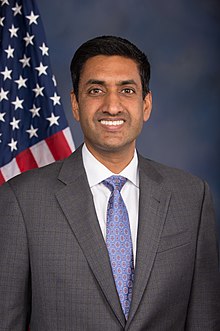Many politicians can say little in a lot of words. But it’s a rare politician who can say a lot in a few words. Congressman Ro Khanna (D-District 17) is one of them. Recently, he took some time from a jam-packed day to talk with the Weekly.
Elected in 2016, Khanna currently sits on the House Budget and Armed Services committees and is a Vice Chair of the Congressional Progressive Caucus.
Khanna isn’t a stranger to government and the challenges of governance. He was Deputy Assistant Secretary at the U.S. Department of Commerce in President Obama’s administration and was appointed by Governor Jerry Brown to the California Workforce Investment Board.
“The closest most people will get to the federal government is their Congressman,” he explains. “If someone loses their passport, you’re the first person they contact. When people want to let off steam about public issues, you’re their first point of contact. You feel a great sense of obligation to everyone you’re representing.”
Although the phrase “do nothing congress” has been hurled at the government for 70 years, Congress Members are busy people.
“It’s just not true that Representatives spend all their time meeting lobbyists and raising money,” Khanna said. “They’re in committee hearings. They’re on the floor of the House. They’re meeting with colleagues. They’re meeting with constituency groups.
“Most people go to Congress with a passion to make their community and their country better,” he continued. “If folks would shadow us for a day or two, they’ll find out it’s not like House of Cards,” he laughed.
The basic job, Khanna says, is listening to your constituents and pushing for changes in administrative agencies and in program funding.
“It’s not glamorous in any way,” he said. “It’s ‘in the weeds’ work, reading bills, reading budgets. And even when you go home you’re preparing the questions you’re going to ask at upcoming hearings and the bills you’re going to vote on.”
Every Member of Congress is part of team, he says.
“The people in our offices are working to solve problems on a day-to-day basis,” he explained. “An issue with Social Security. Someone is not able to get funding for a school. A problem with Medicare. There’s a whole team that helps me on case work.”
As for the other cynical cliché about Congress not listening to constituents, it’s equally untrue. “There’s a lot of work that goes into trying to get constituents ideas and requests into a bill or a budget.”
For example, “People ask, ‘Can we get more funding for Alzheimer’s on the NIH budget?’ ‘Can we help find funding for job training programs that can help people get jobs in cyber security?’ ‘Can you push for funding for this program for disability rights?’
“It’s not going to get the attention of the news,” he continued. “But understanding constituents’ ideas and priorities can have a lot of impact on legislation.”
Another part of Khanna’s job is working with public agencies to address constituents’ concerns—for example, working with the FAA on San José airport noise. “We’re working to see if we can change the flight trajectories.”
Relationships are essential for being effective in Congress.
“You don’t just have to meet with the other members of Congress,” he said, “you have to meet with the right staff, the people who have the levers to get things into bills and get your priorities through.”
Khanna says it’s not true that if your party doesn’t control congress, you don’t have any power. “There’s a difference between power and influence,” he said. “You can have an extraordinary amount of influence, still, while being in the minority. You need ideas.”
“As a congressman you have a huge bully pulpit for your ideas,” he said, “and if they’re good ideas they become part of the public debate, and you will change policy and laws. You may not get the big wins, but you can influence the things you care about—especially if they’re issues about kids, fighting disease or creating jobs.”
One of Khanna’s ideas is expanding the Earned Income Tax Credit, which helps working people at the low end of the income range.
“So if you’re making $50,000 in Santa Clara and you have one kid, if this passes, you’re going to get an extra $5,000 in earned income tax credits,” he explained. “Suddenly a lot of Senators are talking about it. Republicans are talking about it. It may not pass, but the main thing is that it’s an idea that’s in the public debate.”
Relationships across parties is also important.
“I may disagree with the whole budget, but I may be able to get cooperation from a Republican Congressman on parts of that policy,” Khanna said. “Even if you can’t vote for that bill in aggregate, you can influence parts of that bill.”
Again, working effectively in Congress always comes back to relationships. “People will respect your convictions as long as you don’t make it personal,” he adds. “It’s about finding an issue that you can agree on.
One of the biggest issues facing the U.S. is the profound division in our public life, Khanna believes.
“We’ve become so divided along party lines, geographical lines, nationality and racial lines,” he said. “The question is: how do we build a common American, common political culture and a common understanding of history?
“My answer is that every American should read four things: The Declaration of Independence, the U.S. Constitution, the Gettysburg address, and Dr. King’s ‘I have a Dream’ speech. We have to have a common civic education from a young age to adulthood.”
Khanna also has some ideas about how to execute on that idea.
“Congress could pass legislation for a core civics education curriculum that includes American institutions and history, and the principles that underlie them,” he explained. “It’s a common language, really, and the challenge is, what would a common American citizenship curriculum look like?”






